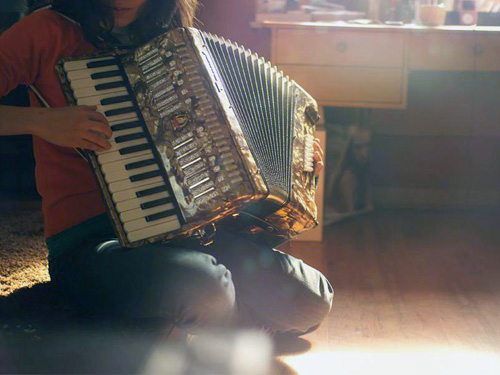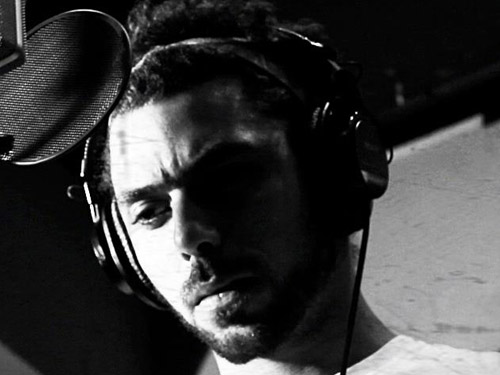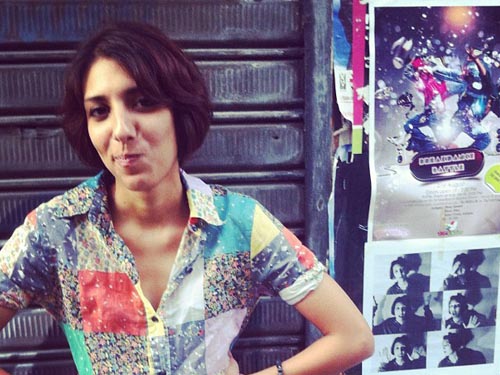
Youssra El-Hawary seems to have a magic touch. Her music video for the song “Al-Soor” (“The Wall”), the first video the 28-year-old singer has made, became an immediate internet sensation. The video shows Hawary playing her accordion as morning light breaks over one of the several walls blocking downtown Cairo’s streets.
She sings:
“In front of the wall/In front of those who built it/In front of those who made it high/Stood a poor man/And peed/On the wall and those who built it and those who made it high.”
The words are well-suited to mocking the crude stone edifices that are a daily logistical headache for anyone navigating the streets of downtown Cairo, but they were written several years ago, long before the walls were built, by well-known caricaturist Walid Taher.
Taher is a friend of Hawary’s, who shares her comedic take on the large and small frustrations of daily life in Egypt. The two had discussed collaborating before, but when Hawary read Taher’s writing about walls, she immediately thought of the walls in downtown Cairo, wrote the song, and filmed the music video that has now has garnered over 100,000 hits on YouTube.
Countless videos have been released over the past year that in some way confront the political situation of the moment, but these songs have tended to remain in the realm of protest songs, notable mostly for their political messages. “The Wall” is certainly topical and timely, and it does have a political message, undercutting the power of the walls by making them objects of ridicule, but the song itself is also simple and infectious — it gets stuck in your head — and the video has introduced a dynamic new performer.
Hawary has a natural appeal and a charismatic stage presence that is immediately seductive. In a few short months, she has gone from never performing her songs in public before to a level of minor stardom within the Cairo independent music scene.
But it is logical that her rise would be somewhat haphazard. Hawary has never gone about writing and performing her own music in a particularly intentional way. To make the video for “The Wall,” she simply went to the walls at 6 am one day, with her friend Sarah Yehia, a photographer trying her hand for the first time at filming video. The two spent a couple of hours filming the performance, edited it together and posted it on the internet, with the postscript “not everything should have a director.”
Although she only recently began performing her own songs in public, Hawary has been playing music for her whole life. She started learning piano at age 8, and after finishing a degree in set design for theater and cinema at Helwan University’s Faculty of Fine Arts, she began performing as both an actress and a singer with the Al-Tamye theater group, which produces performances incorporating music and storytelling, as well as video and multimedia elements. She picked up the accordion a couple of years ago because she wanted an instrument she could take out and about, to play along with her guitar-playing friends. Now she composes all her songs on accordion.
In 2010, with fellow Al-Tamye member Salam Youssry, as well as curator Sarah Rifky, education activist and stand-up comedian Motaz Attalla, and Egypt Independent reporter Mai Elwakil, Hawary co-founded the Cairo Complaints Choir, which eventually became the Choir Project, a group that organizes monthly workshops during which anyone can come and put together songs around a changing theme. With the collected writings, musicians set to work putting the words to music to be performed by the group.
“The choir helped me very much in composing. I worked with other musicians, we came up with melodies and I saw how simple it was,” says Hawary.
But it was not until a few months ago that she first began to bring her own songs into the public sphere.
“In the theater, I performed other people’s songs; I felt my songs were very personal, and not for performance,” she says.
Then, while conducting a workshop for the Choir Project in Beirut, Hawary found herself performing a few songs in a bar, and the audience’s positive reaction surprised her.
“That was the first time I thought, ‘What’s this? People like my songs!’”
Her music is imminently likeable, especially to those with a soft-spot for accordion. They are short and playful, with catchy melodies and accompaniment that is reminiscent of music one might here in an imagined French cafe. But her subject matter is often not so light-hearted.
The song “Autobis” tells a tale of being stuck in Cairo traffic behind a huge bus spewing black smoke. Hawary wrote the song while stuck in traffic behind exactly such a bus, but the finished song took on a more metaphoric significance.
“People started to try to understand what the bus symbolized. They would say, OK, she means by the bus all the people in Egypt blocking us from seeing the light,” says Hawary.
Another song, “Jessica,” talks about the girl who once stole Hawary’s boyfriend.
“I do not like to express my feelings in a sad, dramatic way,” says Hawary, “I can talk about bad and hard things this way. You laugh, and then you think after laughing.”
Hawary writes lyrics that come from the way she speaks about things in life, and this sometimes gets her into trouble. In “Autobis,” she repeats the minor expletive, “khara” (shit) several times, and her use of the word drew criticism from viewers online who felt a young female singer should not use such language. When performing “Jessica,” she edited out a more potentially offensive word because she felt it would be a little too shocking for her audience.
Despite her recent bout of success, Hawary is happy to continue on with her music career in the same do-it-yourself manner that she always has — writing when she feels moved to write, making videos when she has a good idea and performing when the opportunity arises.
“People are asking, when is your next concert, people in Alexandria are calling me, asking me to play, and I do not even think of myself as a singer,” she says. “But I think I will keep doing it this way. I will just make things as I feel or see something because I have always done it that way, and I think that is what people like about my songs.”
Although she may have a laid-back attitude toward her career, both Hawary’s songs and her stage presence evoke the kind of immediate reactions from audiences that indicate a remarkable performer, and it would not be surprising if she found herself with even more significant success in the very near future.
Photo: Courtesy of Sara Yahya




